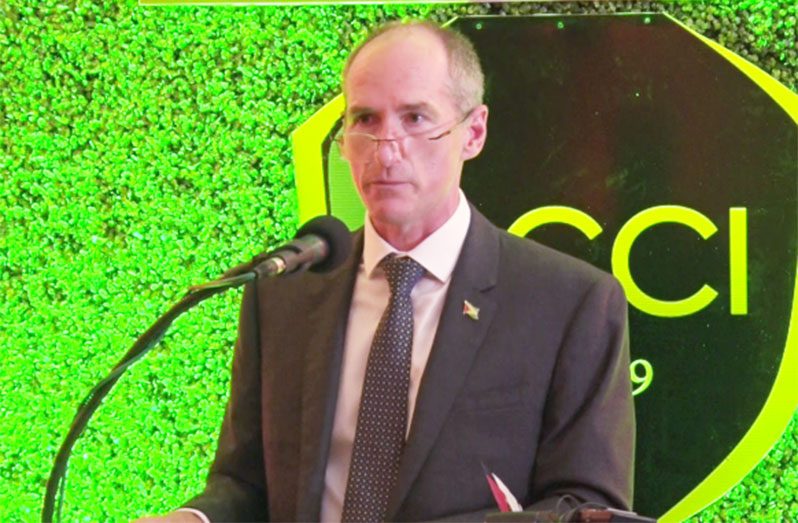–almost entire supply chain for the company has been relocated to Guyana, says ExxonMobil Guyana President
OVER 800 Guyanese have been supplying ExxonMobil since the oil-and-gas giant commenced operations in Guyana in 2015, President of ExxonMobil Guyana, Alistair Routledge, has said.
Within this period, the company has spent US$540 million to procure goods and services from those suppliers, the ExxonMobil Guyana President said during his remarks at the Georgetown Chamber of Commerce and Industry (GCCI)’s 132nd Awards Ceremony and Gala Dinner, on Thursday evening.
“I am a firm believer — as it is the position of ExxonMobil — that Guyanese should not only benefit from the revenues that come from oil and gas, but should play an active role in the development of the resource as well,” Routledge related.
He highlighted that to date, more than 3,200 Guyanese are working on ExxonMobil’s local operations and almost the entire supply chain for the company’s offshore activities has been relocated to this country.
“To date, all of the major international oil-and-gas contractors have a presence in Guyana and have steadily been moving activities from the United States, Brazil and Trinidad and Tobago,” he said.
Routledge added: “This has created opportunities for the Guyanese private sector — whether it is build-outs for shore base, warehousing, or waste-treatment facilities.”
He said that as ExxonMobil Guyana advances its operations and explores new projects, it views involvement of the Guyanese workforce and suppliers of goods and services as crucial.
To achieve success in the industry and “win work,” local suppliers need to enhance their skills and capacity by forming small partnerships with foreign companies, which will transfer critical skills and technology.
“This needs to be a win-win dynamic for international and local companies. International companies need to feel welcome and can generate some value for their investment in technology and knowledge transfer,” he said.
Additionally, he reasoned: “Just as other countries with large or growing energy sectors, Guyana will need stable rules that facilitate large-scale investments and set priorities and outline achievable targets for the industry, rather than trying to make rapid progress in every sector simultaneously.”
Further, Routledge highlighted that the Guyanese private sector will play a pivotal role in the development of Guyana’s energy sector and could use the opportunity to build capacity, capability and experience for long-term international competitiveness.
“The critical factor is building local capacity and capability, from which growth in local content will follow. The progress made by the private sector already in Guyana goes well beyond what I’ve experienced previously at this stage,” he said.
Also addressing the gathering at the ceremony, Vice-President Dr Bharrat Jagdeo said that when the National Assembly reconvenes next week, the government will be moving to table two critical pieces of legislation: the Local Content Legislation and amendments to the Natural Resources Fund (NRF) Act.
It is expected that such Local Content Legislation will cater for the existing conditions, and while this would indeed be the case, President Dr Irfaan Ali had held firmly to the view that such a framework must not be static.
“Local content is not meant [to] be static… as our country continues to grow and change in nature, different aspects of the economy will evolve and the document has to evolve to match this development,” President Ali said during the opening of a stakeholder engagement forum on local content, at the Arthur Chung Conference Centre, in February.
In outlining his vision for this policy on the first day of the process, President Ali said: “For us, the policy has to be a living policy, one that is flexible, responsive and one that has great clarity and sets a framework through which all are engaged and understand their responsibilities to local content.
“Local content is not only about doing business… local content is about building the capacity of local companies, giving them the capability to become globally competitive, so that they can have necessary transformation that would lead them to the next level.”
It is for this reason that the President said the policy, contrary to the belief that it will focus specifically on oil and gas, would cover every sector in the country.
“While it [oil and gas] will be one critically targeted area, the local content policy is one that will cover every sector of the country. There is focus on insurance; the banking sector; development of manufacturing capacity; rentals, human resource transformation; and training and development in all emerging areas of the economy,” the Head-of-State reasoned.
The policy would particularly address evident shortfalls in the human-resource capacity, the level of capital and the utilisation of technology.
“In recognising this [shortfalls], we have to put the systems in place to bridge that gap… in the interim, we have to define a space for local business and local participation while we bridge that gap,” President Ali said.
For instance, the policy must “carve out” the opportunities within the oil-and-gas sector which are available solely to local suppliers.



.jpg)











